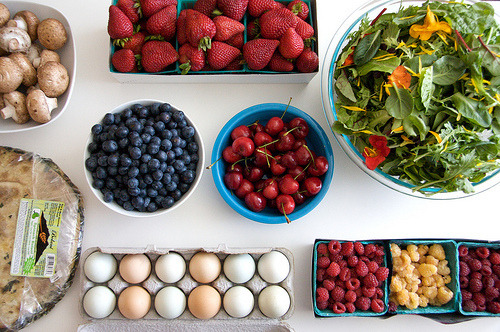Dietary fats may cause weight gain
Fats contain approximately double the amount of kilojoules (calories) per gram than carbohydrates or protein. They are a very concentrated form of energy. If you eat a lot of fat, you are likely to put on weight.
The type of fat you eat is also important. Polyunsaturated and monounsaturated fats (from fish and plant sources) provide some health benefits and should be included in small amounts in the diet. Saturated fat from animal sources can have a negative impact on your health.
If you eat more kilojoules than you use, you will put on weight whether those kilojoules came from fats, carbohydrates or proteins.
Low, moderate or high-carbohydrate diets
In the short term, very low-carbohydrate diets can result in greater weight loss than high-carbohydrate diets, but in the long term, weight loss differences appear to be minimal. Very low-carbohydrate diets can be unhealthy as carbohydrates are the preferred fuel source for our bodies to work effectively. The long-term safety of these diets is unknown.
Five food myths exposed
There are many myths about foods - what you should eat and when you should eat them. We expose five myths as false.
1. Potatoes make you fat – false
It was once thought that the key to weight loss was eliminating all high-carbohydrate foods, including pasta, rice and potatoes. We now know that carbohydrates are the body's preferred energy source. Eating a potato, or any type of carbohydrate rich food, won't automatically make you fatter.
However, if you are watching your weight, enjoy potatoes in moderate quantities and be careful of how you eat them (for example, butter and sour cream are high in fats. Reduced-fat natural yoghurt is a healthier choice).
You have to regularly eat more energy than your body needs to put on weight. This is harder to do with high-carbohydrate foods than high-fat foods, because carbohydrates contain about half the amount of energy compared with fat. When choosing high-carbohydrate foods such as grains and cereals, wholegrain options are best.
2. Single food diets really work – false
There are plenty of diets based on the belief that the digestive system can't tackle a combination of foods or nutrients. Commonly, carbohydrates (such as grain foods) and proteins (such as meat foods) are said to 'clash', leading to digestive problems and weight gain. The opposite is often true. Foods eaten together can help the digestive system. For example, vitamin C in orange juice can increase iron absorption from a meal rich in plant-based iron like beans and rice, lentils and other legumes.
Very few foods are purely carbohydrate or purely protein; most are a mixture of both. The digestive system contains enzymes that are perfectly capable of breaking down all the foods we eat. Single food diets should be avoided.
3. Breakfast should consist of fruit only – false
There is no evidence that eating only fruit at breakfast has any health or weight loss benefits. Most fruits are not very high in complex carbohydrates, which the body needs for fuel after an all-night fast. They are, however, a good source of fibre and vitamins.
Cereal foods (especially wholegrain varieties) like bread, muffins and breakfast cereals are a much better source of carbohydrates to get you going in the morning. You can add fruit to your breakfast for additional nutrients and taste.
4. There are some magical foods that cause weight loss – false
Some foods, such as grapefruit or kelp, are said to burn off body fat. This is not true. Dietary fibre comes closest to fulfilling this wish, because it provides a feeling of 'fullness' with minimal kilojoules. High-fibre foods such as fruit, vegetables, wholegrain breads and cereals, and legumes also tend to be low in fat.
5. Drinking while you are eating is fattening – false
The theory behind this misconception is that digestive juices and enzymes will be diluted by the fluid, and this will slow down the digestion and lead to excess body fat. There is no scientific evidence to back this up.
In fact, evidence suggests that drinking water with your meal improves digestion. Kilojoule-heavy drinks such as alcoholic beverages can be fattening if consumed in excess, but drinking them with meals doesn't make them more fattening.
The key to weight loss
The best way to lose weight is slowly, by making small, achievable changes to your eating and exercise habits. Aim for a healthy waist circumference of less than 94 cm for men and less than 80 cm for women.
Suggestions for safe and effective weight loss include:
- · Don't crash diet. You'll most likely regain the lost weight within five years.
- · Cut down on dietary fats, especially saturated fat, and choose low-fat varieties where possible.
- · Cut back on refined sugars.
- · Increase your intake of fresh fruit, vegetables, and wholegrain breads and cereals.
- · Consume less alcohol.
- · Eat less takeaway, snack foods and sugary drinks.
- · Exercise for approximately 30 minutes on most days of the week. Introduce more movement into your day – try to include 30 minutes of walking daily.
- · Don't eliminate any food group. Instead, choose from a wide range of foods every day and choose 'whole', less-processed foods. Have a regular pattern of eating and stick to it.
Where to get help
- · Your doctor
- · Dietitians Association of Australia Tel. 1800 812 942
Things to remember
- · 'Crash dieting' can affect your physical and mental wellbeing.
- · There are no magical foods or ways to combine food that will help you lose weight.
- · The best way to lose weight is slowly, by making small, achievable changes to your eating and exercise habits.
Source
http://www.betterhealth.vic.gov.au/bhcv2/bhcarticles.nsf/pages/weight_loss_common_misconceptions?open


No comments:
Post a Comment